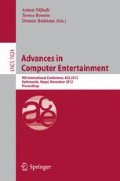Abstract
In this article we present a system that enhances content in platform game levels. This is achieved by adding particular gaming entities and adjusting their arrangement, causing consequent changes in the inherent difficulty and in path related aspects. This idea follows our prior work for the automatic creation of level environments. Starting with a primal level structure and a corresponding graph that sketches the user path, the system detects mandatory and optional path sections and adapts them in order to create more elaborate challenges to the user, forcing detours to gather specific objects or trigger certain events. Alternatively, a designer can create that base level structure and use the algorithm to adapt it to a certain profile. Also, some adjustments can be made to enhance multiplayer cooperative gaming for uneven skilled players, where the path is adapted to force a difficult route to one player and an easier one for the other player. Our experiments showed interesting results on some popular games, where it is possible to observe the previous principles put into practise. The approach is generic and can be expanded to other similar games.
Access this chapter
Tax calculation will be finalised at checkout
Purchases are for personal use only
Preview
Unable to display preview. Download preview PDF.
References
Compton, K., Mateas, M.: Procedural level design for platform games. In: Proceedings of the Artificial Intelligence and Interactive Digital Entertainment International Conference (AIIDE) (2006)
Csikszentmihaly, M.: Flow: The Psychology of Optimal Experience. Harper Collins, NY (1991)
Jennings-Teats, M., Smith, G., Wardrip-Fruin, N.: Polymorph: Dynamic Difficulty Adjustment through Level Generation. In: Proceedings of the Workshop on Procedural Content Generation in Games (2010)
Mawhorter, P., Mateas, M.: Procedural Level Generation Using Occupancy-Regulated Extension. In: CIG 2010 - IEEE Conference on Computational Intelligence and Games (2010)
Mourato, F., Próspero dos Santos, M.: Measuring Difficulty in Platform Games. In: Interacção 2010 – 4a Conferência Nacional em Interacção Humano-Computador (2010)
Mourato, F., Próspero dos Santos, M., Birra, F.: Automatic level generation for platform videogames using Genetic Algorithms. In: ACE 2011, 8th International Conference on Advances in Computer Entertainment Technology (2011)
Nygren, N., Denzinger, J., Stephenson, B., Aycock, J.: User-preference-based automated level generation for platform games. In: IEEE Symposium on Computational Intelligence and Games (2011)
Pedersen, C., Togelius, J., Yannakakis, G.: Modeling player experience in Super Mario Bros. In: Proceedings of the 5th International Conference on Computational Intelligence and Games, CIG 2009 (2009)
Shaker, N., Togelius, J., Yannakakis, G., Weber, B., Shimizu, T., Hashiyama, T., Soreson, N., Pasquier, P., Mawhorter, P., Takahashi, G., Smith, G., Baumgarten, R.: The 2010 Mario AI Championship: Level Generation Track. Special Issue of IEEE Transactions on Procedural Content Generation (2010)
Smith, G., Cha, M., Whitehead, J.: A Framework for Analysis of 2D Platformer Levels. In: Proceedings of the 2008 ACM SIGGRAPH Symposium on Video Games, pp. 75–80 (2008)
Smith, G., Mateas, M., Whitehead, J., Treanor, M.: Rhythm-based level generation for 2D platformers. In: Proceedings of the 4th International Conference on Foundations of Digital Game (2009)
Smith, G., Whitehead, J.: Analyzing the Expressive Range of a Level Generator. In: Proceedings of the Workshop on PCG in Games, Monterey, CA (2010)
Smith, G., Whitehead, J., Mateas, M., Treanor, M., March, J., Cha, M.: Launchpad: A Rhythm-Based Level Generator for 2D Platformers. IEEE Transactions on Computational Intelligence and AI in Games (TCIAIG) 3(1) (2011)
Togelius, J., Karakovskiy, S., Baumgarten, R.: The 2009 Mario AI Competition. In: IEEE CEC - Congress on Evolutionary Computation (2010)
Viglietta, G.: Gaming Is a Hard Job, But Someone Has to Do It! In: Kranakis, E., Krizanc, D., Luccio, F. (eds.) FUN 2012. LNCS, vol. 7288, pp. 357–367. Springer, Heidelberg (2012)
Author information
Authors and Affiliations
Editor information
Editors and Affiliations
Rights and permissions
Copyright information
© 2012 Springer-Verlag Berlin Heidelberg
About this paper
Cite this paper
Mourato, F., Birra, F., Próspero dos Santos, M. (2012). Enhancing Level Difficulty and Additional Content in Platform Videogames through Graph Analysis. In: Nijholt, A., Romão, T., Reidsma, D. (eds) Advances in Computer Entertainment. ACE 2012. Lecture Notes in Computer Science, vol 7624. Springer, Berlin, Heidelberg. https://doi.org/10.1007/978-3-642-34292-9_6
Download citation
DOI: https://doi.org/10.1007/978-3-642-34292-9_6
Publisher Name: Springer, Berlin, Heidelberg
Print ISBN: 978-3-642-34291-2
Online ISBN: 978-3-642-34292-9
eBook Packages: Computer ScienceComputer Science (R0)

